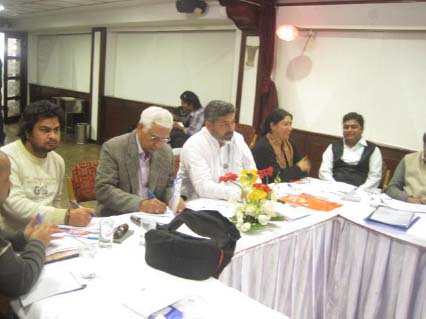/topics/contamination-pollution-and-quality
Contamination, Pollution and Quality
Drafting a new National water policy, 2012 without consulting the farmers would be meaningless
Posted on 04 Mar, 2012 11:02 PMAuthor : Phanish Sinha
In India, water problems are 'man made': Comments on the draft water policy-2012
Posted on 29 Feb, 2012 11:02 AMAuthor : Nagesh Hegde
Draft National Water Policy 2012 - Dialogue organised by NEER Foundation, Meerut on February 18, 2012
Posted on 27 Feb, 2012 10:07 AMGuest post by: Raman Kant Tyagi

Quantitative data on water quality: A compilation of papers that present physico-chemical analyses of various water sources in India
Posted on 24 Feb, 2012 08:31 AMAssessment of physico-chemical quality of groundwater in rural area nearby Sagar city, Madhya Pradesh
This paper presents the results of forty groundwater samples collected from June 2007 to July 2010 in Gambhira and Baheria villages in Madhya Pradesh. The authors conclude that the ground water quality is degraded due to anthropogenic causes.
"In search of old ideas" - A discussion of the draft national water policy 2012, by Jayanta Bandopadhyay in The Telegraph
Posted on 22 Feb, 2012 05:05 PMAuthor: Jayanta Bandopadhyay
Article and image courtesy: The Telegraph
Prevalence of dental fluorosis and associated risk factors in school children from Kanyakumari district, Tamil Nadu - Paper published in the Indian Journal of Dental Research
Posted on 22 Feb, 2012 01:51 PMA total of 1800 children from all the nine blocks of Kanyakumari district from 6th to 10th standard were examined using type III examination. Dental fluorosis was present 15.8% of the study population and varied from as low as 1.4% to as high as 29.4% in different areas. There was a significant difference in dental fluorosis levels between rural and urban residents.
New water policy more contentious; least helpful in tackling existing issues
Posted on 22 Feb, 2012 12:34 PMAuthor : Dr. Arvind Kumar
How valuable are environmental health interventions? - Evaluation of water and sanitation programmes in India - Paper published in the Bulletin of the World Health Organisation
Posted on 21 Feb, 2012 06:11 PMThe paper informs that a number of epidemiological studies on the benefits of water and sanitation interventions have shown that diarrhoea can be reduced by 30–50%.
An ecological quantification of the relationships between water, sanitation and infant, child, and maternal mortality - Paper published in the Journal Environmental Health
Posted on 21 Feb, 2012 03:30 PMA number of studies have made associations between prevention of disease burden among populations by improving water supply, sanitation, hygiene and management of water resources and between poor water quality and disease burden.
Impacts of climate change on public health in India - Future research directions - Paper published in Environmental Health Perspectives
Posted on 19 Feb, 2012 11:00 PMThis paper published in the journal Environmental Health Perspectives reviews the current state of the science relevant to the 2009 Joint Indo–U.S. Workshop on Climate Change and Health that was held in Goa, India, and, then discusses the observed relationships between climate variability and human health specifically in relation to the Indian subcontinent, highlighting future research directions.
The paper briefly summarises relevant literature on the impacts of climate change in India and touches upon the opportunities and significant challenges associated with designing, initiating, and conducting research, as well as pursuing related public health programming to improve public health infrastructure in the face of climate change. The paper argues that such research is needed to pave the way for unique and pioneering solutions that can improve public health in the face of increasing climate variability.





